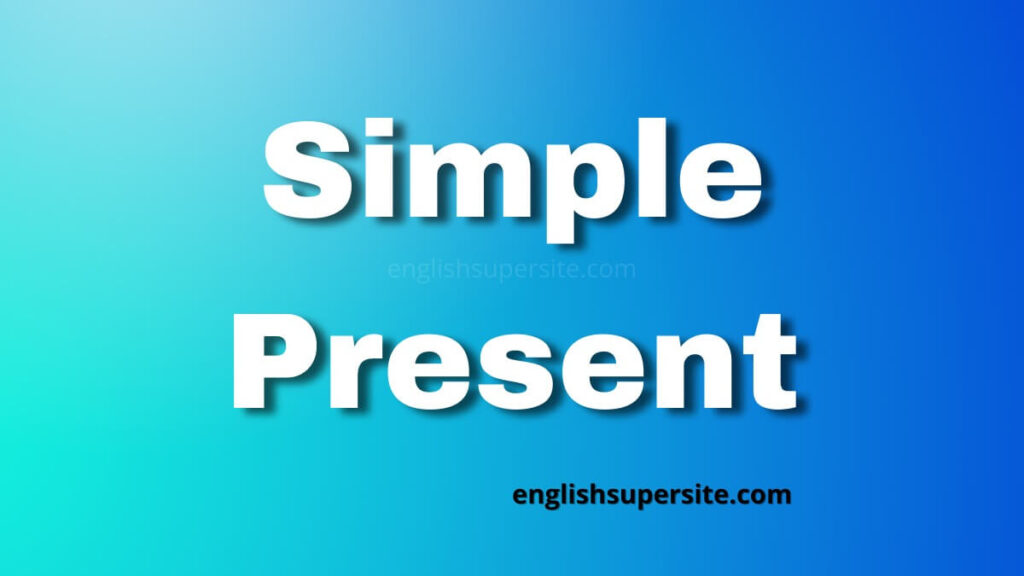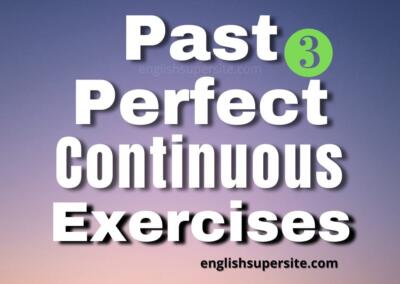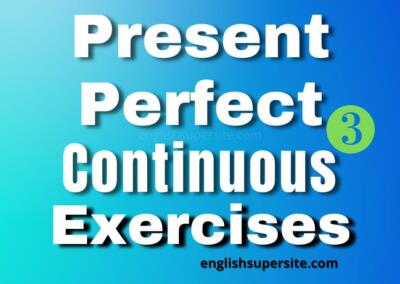
Simple Present
Sometimes called Present Simple or Present Indefinite, the Simple Present is a Verb Tense associated with the Present Tense in English.
We use Simple Present to express habits, routines and repetition. As well as present state of affairs and things in general.
Quick Example
- You study English every day.
- You do not study English every day.
- Do you study English every day?
Form
| I – you – we – you – they | he – she – it |
|---|---|
| Infinitive | Infinitive + -s, -es or -ies |
Rules to add -s, -es or -ies:
| Verbs | Add |
|---|---|
| Verbs ending in “ch”, “o”, “s”, “sh”, “x” and “z” | add “es” (watch – watches | kiss – kisses) |
| Verbs ending with consonant + “y” | add “ies” (fly – flies | cry – cries) |
| Verbs ending with vowel + “y” | add “s” ( play – plays | say – says) |
| All* other verbs | add “s” (talk – talks | follow – follows) |
*Verb “to be“: am / is / are
*Verb “to have“: has
Common Signal Words
- Every… (every day, every afternoon, every night, every Monday, every week)
- First… then…
- Always
- Usually
- Often
- Sometimes
- Seldom
- Rarely
- Never
Use
The Simple Present is a verb tense used to express:
- Habits, Routines and Repetition
- Present State of Affairs and Things in General
- When one action follows another, for Instructions and Directions
- Future Timetables and Fixed Arrangements
- Now
1. Habits, Routines and Repetition
Use Simple Present to express a habitual action, an action that is repeated or usual.
- I work every day.
- We speak English.
- She studies English.
- He plays soccer.
- She always forgets her keys.
- I watch the news in the evenings.
- They listen to the radio in the mornings.
- The sun rises in the east.
2. Present State of Affairs and Things in General
A general situation and circumstances connected with someone or something.
- My sister lives in Florida.
- Dogs love to play.
- Trees live for a long time.
- Florida is in the United States.
- Sao Paulo is a large city.
- Water freezes at zero degrees.
- He is tall.
3. When one action follows another, for Instructions and Directions
- First I wash my hands, then I cook lunch.
- Please, open the drawer, get the scissors and cut this packet for me.
- You can take the bus and get off on Main Street.
4. Future Timetables and Fixed Arrangements
- My train departures at 11:00 am.
- The plane leaves at 10:00 pm.
- Your exam starts at 8:00 am.
- His father arrives tomorrow.
- The doctor will see you before she leaves.
5. Now*
To express the idea that an action is happening or is not happening now (at this very moment).
- He needs your help now!
- Do you have your driver’s license with you?
- They are not here now.
*ATTENTION!!! Do not use the Simple Present to express actions happening now and giving a sense of continuity. We have other verb tenses to do that depending of the situation.
Study Also:
Examples
Simple Present using Work (Regular Verb)
| Affirmative | Negative | Interrogative |
|---|---|---|
| I work. | I don’t work. | Do I work? |
| You work. | You don’t work. | Do you work? |
| He works. | He doesn’t work. | Does he work? |
| She works. | She doesn’t work. | Does she work? |
| It works. | It doesn’t work. | Does it work? |
| You work. | You don’t work. | Do you work? |
| We work. | We don’t work. | Do we work? |
| They work. | They don’t work. | Do they work? |
Simple Present using Go (Irregular Verb)
| Affirmative | Negative | Interrogative |
|---|---|---|
| I go. | I don’t go. | Do I go? |
| You go. | You don’t go. | Do you go? |
| He goes. | He doesn’t go. | Does he go? |
| She goes. | She doesn’t go. | Does she go? |
| It goes. | It doesn’t go. | Does it go? |
| You go. | You don’t go. | Do you go? |
| We go. | We don’t go. | Do we go? |
| They go. | They don’t go. | Do they go? |
Simple Present using Study (Regular Verb)
| Affirmative | Negative | Interrogative |
|---|---|---|
| I study. | I don’t study. | Do I study? |
| You study. | You don’t study. | Do you study? |
| He studies. | He doesn’t study. | Does he study? |
| She studies. | She doesn’t study. | Does she study? |
| It studies. | It doesn’t study. | Does it study? |
| You study. | You don’t study. | Do you study? |
| We study. | We don’t study. | Do we study? |
| They study. | They don’t study. | Do they study? |
Study Also:
Abbreviations Cohesion and Coherence Collocations Comparative Conditionals Frequent Errors Future Continuous Future Perfect Future Perfect Continuous Future Simple Homonyms Interjections Journaling Learn English Linking Words Logical Flow Past Continuous Past Perfect Past Perfect Continuous Past Simple Plural Present Continuous Present Perfect Present Perfect Continuous Present Simple Pronunciation Question Tags Quiz Quotes Simple Future Simple Past Simple Present Spelling Superlative Transition Words
Share with your friends!






